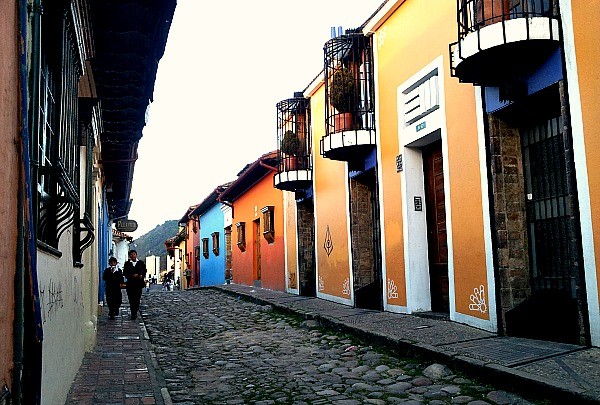
I am a walking caricature of a Latina. I have curly dark hair, brown eyes, tan skin and hips that knock cups off tables. But even with my stereotypical Latina features, last name and my irrational anger for subpar flan, I have always felt like an outsider peering into Hispanic culture. Now that I live in Colombia, that feeling of not belonging has only been magnified.
But let’s back up so I can give you some background. My dad is from Venezuela and my mom is from the United States. He checks the “Hispanic” or “Latino” box and she checks “White” or “Caucasian.”
More: What’s it like living in Colombia?
I was born, went to school and worked in the United States for the first 23 years of my life, and I never knew which box to check. Growing up, my dad never spoke Spanish to me or my younger brother. He made us arepas on the weekends for breakfast and he would sometimes grab me from my chair and swing me around the kitchen while Salsa blasted from the stereo, but imparting his language and culture onto his children was never his main priority.
Wanting to improve my intermediate-level Spanish I learned in school and to feel more connected to my Latin heritage, I quit my job as a radio news anchor and moved to Colombia alone at the beginning of 2016. Moving to Venezuela was not an option because of the country’s alarming downward spiral, so in my mind, Colombia was the next best thing.
I’m in a unique position to blend in with Colombians, while still viewing my new country through the eyes of a foreigner. I do not woefully stick out like my blond, fair-skinned friend did when she came to Colombia to visit me. Moreover, I feel that I am generally safer than a Gringa would be walking around the city.
The problems come when it’s time for me to speak. Since everyone assumes I’m Colombian, no one slows down or opts to use standard Spanish verses the Colombian slang they figuratively hurl at me, hard and fast. I respond timidly and slowly, the Spanish words still feel awkward rolling around in my mouth.
If I don’t immediately inform the Colombian that I am a foreigner, the person will suspiciously peer into my face, trying to figure out if I am faking my language problems or perhaps I am just mentally unstable. I smile and try to finish up whatever business we are conducting as quickly as possible.
More: Plan your own trip to Colombia
When it comes to dating in Colombia, I joke that whoever finds himself across from me at dinner or a bar has received a pretty rotten deal in terms of dating a foreigner. He has to accept all the language barriers and cultural misunderstandings (did he say he was leaving his house in 15 minutes or he would be at my house in 15 minutes?) But he misses out on the small, irrational thrill many of us experience by being with someone considered “exotic.”
This all may sound a bit superficial, but these are the observations and reflections I didn’t think I would encounter as a foreigner. Before leaving the United States, I was more concerned about finding a job and safety when I pictured my life in Colombia. Never did I think my physical features and cultural background would be so entangled in the experience.
I know my Spanish has improved since I moved to Colombia. But my advancement in the language doesn’t feel like a triumph because I consider Spanish to be something I should have already known and mastered because I am half Hispanic. I tell myself to stop being so critical. I tell myself it’s not my fault my parents didn’t speak Spanish to me when I was young.
Sometimes, when I’m riding the crowded bus to work with someone’s elbow jamming into my gut and my whole body comically pressed up against the glass doors, I think back to a customer at my part-time grocery store job when I was in high school. She was a little old Hispanic lady with short, curly hair. She came into my check-out line and started speaking the fastest, most muddled Spanish I have ever heard.
More: Meet other expats living in Colombia
I told her that my Spanish was very basic and I didn’t understand her question. Without knowing my background, without knowing that my primary caregiver (my mom) only spoke English, without knowing that I was one of the highest achievers in my Spanish class, she called me lazy. That stung. I wish it didn’t, but I still remember standing in my smock and slip-proof ugly shoes feeling like this tiny, judgmental woman had slapped me in the face.
I wish she and anyone else who ever questioned my Latina-ness could see me now, because at least I am attempting to learn more Spanish. I uprooted my whole life to master a language and connect to a culture. So maybe my accent isn’t perfect and I still stumble while conjugating past-tense verbs, but at least I’m here. At least I’m trying.
This guest post was submitted by Anneliese Delgado. Anneliese Delgado is an American writer who moved to Bogotá, Colombia alone at the beginning of 2016. She writes about navigating a new country, new culture and new job. When she’s not working, she enjoys playing soccer, traveling and binge-watching Netflix.
You can read more about her experiences about living in Colombia on her blog, AbroadInColombia.com. You can also follow her on Facebook, Instagram, Twitter and Pinterest.
Sign up to receive your FREE eBook
[mc4wp_form]







Thank you for sharing this post! I feel the same way when I visit my mom’s hometown in Mexico. She never taught me Spanish, as she was scared that it would be easier to keep the house all English, given that my dad wouldn’t understand a word. Unlike you, I’m not so obviously hispanic — my looks are rather ethnically ambiguous, plus my super white last name leads most to assume I’m 100% gringa. Anyways, given that I’m moving to Colombia soon, your post gives me a lot of inspiration that I’m not the only one facing the challenges of being a gringa-latina, so thanks again! You’re a great writer, and I wish you the best!
Alexandra, thank you so much for reading. It’s nice to know that I’m not the only “mixed baby” struggling with these kinds of issues. Good luck on your move to Colombia. You are going to have a blast!
Although it can feel natural to expect a person from a Hispanic background to speak Spanish (especially while living or traveling in Latin America), that’s false reasoning. My grandparents were from Russia but I don’t speak a word of Russian – and as an American, no one expects me to. I think those mistaken preconceptions will fade in a generation or two, but it’s tough to deal with in the meantime.
I, on the other hand, suffer from the opposite. In Latin America people look at my blonde hair and European-looking face and figure I can’t speak a word of Spanish – even though I’m completely fluent. We just have to laugh at those silly expectations.
All the better to eavesdrop on Spanish conversations 🙂